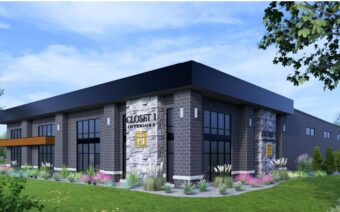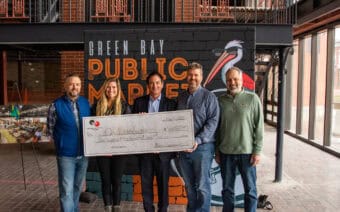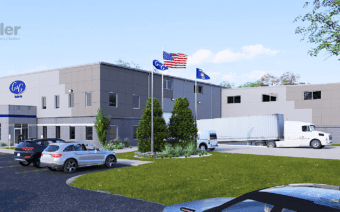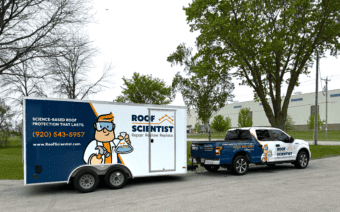
June 14, 2023
GREEN BAY – In today’s job market, affordable and available housing is often a critical topic of conversation surrounding employee attraction and retention.
According to information gathered in a recent housing market study done by the City of Green Bay, Brown County communities will need to add a little more than 300 apartments and 375 single-family homes each year for the next two decades to keep up with the growing demand for housing.
“The lack of affordable housing has been a conversation in our community for quite a few years now,” Jessica Diederich, CEO of Greater Green Bay Habitat for Humanity, said.
Diederich said Habitat for Humanity’s vision is to have a world where everyone has a decent place to live.
“We believe in this vision and strongly feel those in our community should not be faced with the challenges of trade-offs,” she said. “We know the burden a significant number of people within our community are faced with every day. How much of their paycheck will they have to live on after they pay for their unaffordable housing? And what will they choose to spend it on? Will it be food, healthcare or childcare?”
Part of the solution
At a press conference earlier this month, Diederich said the Greater Green Bay Habitat for Humanity is committed to being a part of the solution.
“Over the last 36 years, we have built and sold 131 homes to local residents,” she said. “We have six under construction currently, but we want to do more.”
That “more” comes in the form of a $4-million, 14-unit development planned on Richmond Street on Green Bay’s east side – Habitat Homestead.
Diederich said she hopes the project announcement will help change the narrative in the community of what Greater Green Bay Habitat for Humanity does.
//17bec5072710cda5b8dd81b69f4c6e58.cdn.bubble.io/f1686767201347x582569382381286800/richtext_content.webp Jessica Diederich
“We at Habitat for Humanity are a mortgage lender – we provide 0% interest home loans for brand new homes,” she said. “We are a home builder – we build quality, simple, decent, affordable housing, using volunteer labor under the leadership of our skilled construction staff. We are now also proud to add developer to our title.”
Early last year, Diederich said the nonprofit had the opportunity to collaborate with Encompass to purchase a 2.7-acre lot on the east side of Green Bay.
“We have spent the last 18 months working diligently with the City of Green Bay and its staff on how we can best develop this piece of land,” she said. “We wanted it to be densely populated, fit within the neighborhood and encourage community. Our ultimate goal is to build more homes each year, and this plan will help us achieve that.”
Project details
The 14-unit development includes two, three-unit townhomes and eight, single-family homes, ranging from two to five bedrooms depending on need – with the potential to serve up to 92 people.
According to John Stindt, Greater Green Bay Habitat for Humanity’s construction manager, the townhomes will be around 1,262 feet, the two-bedroom single family will be 1,100 square feet, the three-bedroom model is 1,290 square feet and the four-bedroom option will be 1,485 square feet.
“As far as the timeframe, we are hoping to get this started late July or early August – and that’s with breaking ground for the townhomes,” he said.
Stindt said work may need to be paused briefly in the fall for the city to complete the road infrastructure work, but will resume work on the townhomes when the road work is completed.
//17bec5072710cda5b8dd81b69f4c6e58.cdn.bubble.io/f1686767227661x782481764068467600/richtext_content.webpEight single-family homes will range from two to five bedrooms, depending on need. Submitted Rendering
“Once that’s ready to roll, then we’ll pause some of that building and move onto some of our other homes we need to get finished up, and then get back in there and continue the process,” he said. “Then we’ll come back through and start working on the single-family homes. Basically, trying to stagger that a little bit so we maintain the integrity of the project itself.”
Regarding the overall timeframe for the project, Stindt said, “we’re hoping for 18 to 24 months.”
“Obviously, if we can push that along, we’re going to do it,” he said. “I have no shortage of volunteers who want to get out there and help. So, I’m going to try my best to keep them rolling.”
Financials
The project, which includes the land acquisition, infrastructure build-out and construction of homes, is projected to cost $4 million.
In terms of funding, Diederich said the City of Green Bay is contributing an estimated $900,000.
“Thanks to the City of Green Bay for their support and the various funding opportunities this development will qualify for – we will be left needing to raise $3.1 million to complete the entire development,” she said.
Diederich said because Greater Green Bay Habitat for Humanity is the mortgage lender and the home builder, “we have to pay for all of the materials in advance in order to create these homes and that mortgage for these families moving forward.”
“So, our goal is to raise those dollars to make sure we get ahead of it and we can continue the construction process as efficiently as possible, enabling us to increase the number of homes we build throughout the community in the future,” she said.
//17bec5072710cda5b8dd81b69f4c6e58.cdn.bubble.io/f1686767276082x639590784912001000/richtext_content.webpJohn Stindt
What comes with a project like this, Diederich said, is “we will have $1.5 million in cash flow tied up at any given time.”
This, she said, is new for the organization.
“That is why we’re looking to the community for help,” she said. “We have been fortunate enough that a local couple who have been longtime supporters of Habitat for Humanity has recently pledged $500,000 to support this development. Our ultimate goal now is to raise $2.6 million to be able to take on the cost.”
Community-wide impact
Diederich said the impact of a single Habitat for Humanity new construction home benefits the entire community.
“We purchase our building materials locally,” she said. “We work with local architects, engineering firms and subcontractors. We’re able to save on costs because of the local volunteer labor that dedicates their time to our organization as well.”
Diederich said Habitat for Humanity homes help local families build strength, stability and self-reliance.
“It also creates generational wealth,” she said.
Diederich said the project is also estimated to generate more than $50,000 in property taxes each year.
The goal of Habitat Homestead, Diederich said, is also to create community.
“The homeowners who will be approved into this program will give 3,500 to 7,000 hours of their time to help build their home alongside the homes of their future neighbors,” she said. “If that doesn’t build community, I don’t know what does.”
//17bec5072710cda5b8dd81b69f4c6e58.cdn.bubble.io/f1686767301989x304821096344389100/richtext_content.webp Eric Genrich
Diederich said the City of Green Bay staff, including Mayor Eric Genrich, were great “cheerleaders throughout the process.”
Genrich said just as the project is a new venture for the Greater Green Bay Habitat for Humanity, it is also a new type of partnership for the City of Green Bay.
“I think it’s a demonstration of, first of all, the need we have within this community for additional housing options, especially for low- and moderate-income folks,” he said. “But just an additional appetite for collaboration, because this level of commitment is necessary for us all.”
Genrich said it’s an amazing project for Habitat and the city.
“We are thrilled to be able to get out there and break ground and maybe even pick up a hammer at some point,” he said. “My expertise is typically in demolition, but I’ll try to be as helpful as possible.”
Availability, future
Diederich said most of the project’s homes are not yet spoken for.
“But that’s typical,” she said. “When somebody is accepted into the Habitat for Humanity Homeownership Program, they’re required to fulfill sweat equity hours to help build their home and other homes and help our ReStore. So, with that, it usually takes anywhere from six months to two years, depending on the circumstances or that individual or family, before they receive the keys to their house and start their mortgage.”
In terms of future similar developments, Diederich said “we believe this is just the beginning of what’s to come for our organization.”
“We know this is going to be a cost savings and time savings for us,” she said. “So, we will be continuously looking for pieces of land that are like this. We’ll learn a lot the first time around here, but we know it’s going to be an improvement from buildings throughout the entire county where we have to spread tools out, spread our staff out. To all be on one piece of land will make things move a lot quicker and save us money, which is great at the end of the day because we’re passing those costs on to the homeowners who are purchasing these homes from us.”
Diederich said there are other Habitat for Humanity projects like this in other parts of the country, but Habitat Homestead is geared specifically for Northeast Wisconsin.
“We’ve done a lot of studying – that’s why we’ve been planning for about 18 months, to make sure we did all of our research,” she said. “We talked to other areas – asked them what went right, what went wrong, what changes can be made in planning. We also had to factor in what does our community need here? We’re different from others. And so making sure we’re doing what’s right for Green Bay.”
//17bec5072710cda5b8dd81b69f4c6e58.cdn.bubble.io/f1686767326100x634991698777627000/richtext_content.webpJessica Diederich said approved habitat homeowners are required to fulfill sweat equity hours to help build their home and the homes of their future neighbors. Submitted Rendering
Diederich said there are many opportunities for community members and businesses to get involved in the project and the organization.
“A big one is to come out and swing a hammer and help us build the homes right alongside these future homeowners,” she said. “(We’re also) looking for financial donors, as well as advocates – you can work with a homeowner going through this entire process and walk beside them and support them. You can donate materials to us if you own a local business that wants to help be part of this.”
For more information on Greater Green Bay Habitat for Humanity or the Habitat Homestead project, visit greenbayhabitat.org.
 Home renovation show brings homeowners, contractors together
Home renovation show brings homeowners, contractors together Signs of life: Artist vitalizes communities with ‘vintage’ style
Signs of life: Artist vitalizes communities with ‘vintage’ style








